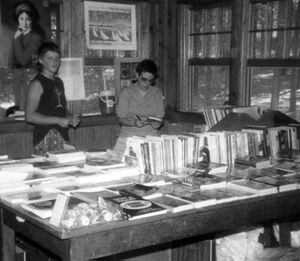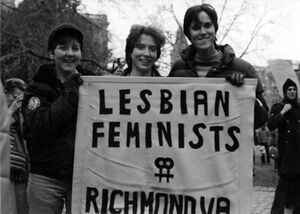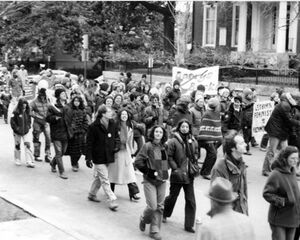Richmond Lesbian Feminists and the Women's Movement
Beth Marschak described the women’s movement in Richmond and the relationship with the lesbian movement in Richmond. The Women’s Liberation movement in Richmond included a number of groups: NOW (starting in 1969 – 1970), the Third District Women’s Political Caucus (started in 1971 and affiliated with the Virginia Women’s Political Caucus and the National Women’s Political Caucus), Richmond Women’s International League for Peace and Freedom (WILPF) and the Richmond Women’s Center. These groups eventually were supportive and essential to the development of the lesbian community in Richmond, specifically Richmond Lesbian Feminists. In addition, there was a National Black Feminist Organization in Richmond, as well as a women’s group that was part of the Socialist Workers’ Party. All of these groups eventually joined together with Richmond Lesbian Feminists to form the Richmond Women’s Alliance which organized three urban Women’s Festival, the first in Monroe Park and two in Byrd Park.
The Richmond Lesbian Feminists are the longest existing LGBTQ group in Richmond. Richmond Lesbian Feminists evolved from a workshop at a state convention of the Virginia Women’s Political Caucus, a nonpartisan political organization encouraging women to participate in politics at all government levels, at Albert H. Hill Middle School held January 18, 1975. The workshop, “Laws for Lesbian Legal Rights,” was led by Beth Marschak. Beth stated that she hadn’t really intended to start a new organization at the time, but she and the other 20 – 25 women at the workshop were painfully aware that “many feminist groups were either ignoring lesbians or actively trying to discourage their participation.” [1]
The Women’s Center, a nonprofit feminist organization providing resources for women’s groups, was important in the development of RLF as well as the Virginia Women’s Political Caucus, a nonpartisan political organization encouraging women to participate in politics at all government levels. Strong women leaders were developed from these organizations and conversely strengthened these organizations; these organizations were just two of the groups that were developing as part of the larger Feminist Movement, and these two groups were really 2 facets of a whole organization. As the women within these groups gained experience in organizing and many of the strong leaders began to acknowledge and affirm that they were lesbians, tension grew. This tension on the national level has been documented in numerous publications.
The Richmond Women’s Center was a nonprofit feminist organization providing resources for women’s groups started by the Virginia Women’s Political Caucus. The Women’s Center was started in 1972 or 1973 and operated out of the local YWCA on Fifth Street. The Women’s Center had a listed phone number and was a way for isolated women, including lesbians, to connect to resources and each other. The Women’s Center was not a lesbian organization, “but a quite a few lesbians were involved,” Marschak recalled. The Women’s Center was eventually asked to leave the YWCA due to being perceived as a “lesbian organization”, illustrating the sometimes contentious nature of the feminist movement with the lesbian movement. Marschak added that at the time there was a perception by the general public that all feminists were lesbians and the feminist organizations were very defensive about that. [2]
RLF has been and is a non hierarchal, loosely organized group and Marschak explained that it actually started as a statewide group of Lesbian Feminists which eventually split into several local groups (it is of note that RLF is the only remaining group still in operation.) The first Lesbian Feminist meeting was held on 2/22/75 at Pace Memorial United Methodist Church with 35 people from various cities in Virginia. [3] Since their founding, RLF has hosted hundreds of social gathering, partnered with dozens of LGBTQ and human rights organizations and provided information to innumerous women about women’s and LGBTQ events through their newsletter which still is distributed in email form. RLF continues monthly potlucks, social gatherings, an annual New Year’s Eve Dance, and the newsletter, although it is now published exclusively online. [4] Beth Marschak and Stephanie Myers are generally accepted as cofounders of the group, and they were both intimately involved and probably carried the organization at times. Beth is quick to point out, however, the RLF was started by a group of women working together to support each other and the community.
Another important development for the women’s community in Richmond was the opening of Labrys Books on April 9, 1978 at 8 North Allen Avenue. Founded by Theresa “Terry” Barry and Joan Mayfield, Labrys sold books by and for women and, along with churches like Pace Memorial Methodist Church, Richmond Friends and the First Unitarian Universalist Church, served as a meeting space for feminists and lesbians in Richmond. Labrys closed in 1981 and Womensbooks, a feminist owned cooperative bookstore started at the YWCA on North 5th Street in the Winter of 1981. WomensBooks later moved to the basement of the Fare Share Food Cooperative on Main Street. Selections included many lesbian books and music when they were hard to find in Virginia. WomensBooks operated until 1993, shortly after Phoenix Rising, a bookstore serving the entire LGBTQ community. [5] Phoenix Rising, run by Jim Todd and Rex Harrison, still operates on Belmont Avenue in Richmond, struggling in this age of easy online access and access in “big box” bookstores such as Borders and Barnes and Noble.
The importance of bookstores before the internet age can not be overlooked or diminished. The independent bookstores, especially those catering first to the women's community and then the the gay and lesbian community, were vital links in finding information. The were a visible, solid, tangible place where people who previously had no connection to the lesbian and gay community could "plug in."
References
- ↑ Bob Swisher "Author/Wit Rita Mae Brown Inspired First Organization" Our Own Community Press, June 1988
- ↑ Bob Swisher “Author/Wit Rita Mae Brown Inspired First Organization,” Our Own Community Press, June 1988
- ↑ Bob Swisher “Author/Wit Rita Mae Brown Inspired First Organization,” Our Own Community Press, June 1988
- ↑ Beth Marschak and Alex Lorch, Lesbian and Gay Richmond, Charleston SC: Arcadia Publishing, 2008. p. 67
- ↑ Beth Marschak and Alex Lorch, Lesbian and Gay Richmond, Charleston SC: Arcadia Publishing, 2008. p.62
<comments />


